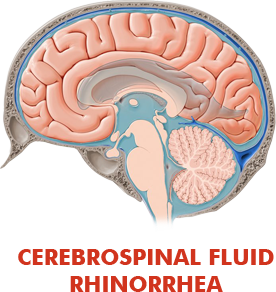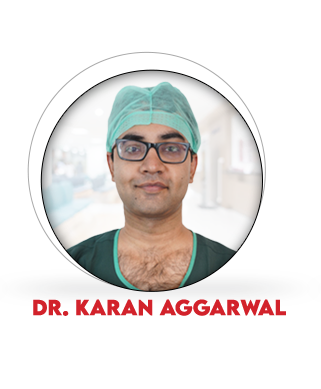1) What is Cerebrospinal Fluid or “CSF” Rhinorrhea?
In the most simplified terms, it refers to the leakage of fluid surrounding your brain through your nose.
2) Is it worrisome?
Yes. The leakage of CSF through your nose implies that there is a direct connection between your nose and the space around your brain. This may result in contamination from nose travelling into your CSF space since the nasal cavities house countless micro-organisms. This can lead to an infection of linings around the brain or the brain itself known as meningitis or encephalitis respectively.

3) What causes CSF Rhinorrhea ?
Most common cause of CSF rhinorrhea remains trauma. Trauma may be accidental or post surgical.
4) Is CSF Rhinorrhea more common in females?
An entity known as spontaneous CSF rhinorrhea is more commonly seen in short, obese and post-menopausal females. This is generally seen in a setting with Benign Intracranial Hypertension wherein the pressure of CSF around the brain rises and sometimes results in CSF rhinorrhea.
5) How do you confirm the diagnosis of CSF Rhinorrhea?
Clinical features such as single-sided watery nasal discharge which the patient is unable to sniff back generally point to a diagnosis of CSF Rhinorrhea. However, to confirm the diagnosis a battery of investigations is done which includes a test on the collected fluid called Beta-2 Transferrin assay, a high resolution CT scan of the skull base and paranasal sinuses and an MR Cisternogram.
6) Is surgery always required for CSF rhinorrhea?
Most traumatic CSF leaks generally stop within 7-10 days with measures such as head elevation and strict bed rest. However, spontaneous leaks or the traumatic ones that do not resolve on their own need surgical repair.
7) How is the surgery done for CSF leaks?
These surgeries are performed by skull base surgeons who may be ENT surgeons or Neurosurgeons. Depending upon the size and location of the defect, it may performed endoscopically or through conventional open approaches. Generally, some soft tissue from abdomen or thigh or from the nasal cavity itself is taken to close the defect.
8) How long does it take to recover from the surgery?
Post-surgery, hospital stay lasts for about 5-7 days. Patients are prescribed CSF pressure lowering agents for a few months post surgery and are kept under regular follow up.

About Expert
Dr Karan Aggarwal is a dynamic ENT and Head-Neck Surgeon. He completed his MBBS in 2012 from the prestigious Government Medical College, Patiala. Thereafter he completed MS in ENT and Head & Neck Surgery in 2016 from the All India Institute of Medical Sciences (AIIMS), New Delhi. Following this, he did a fellowship in Laryngology and Phonosurgery from Medanta, the Medicity, Gurugram from 2016-2017.
Thereafter, he joined AIIMS, New Delhi again to do his Senior Residency in ENT from 2017-2020. With a keen interest in Neurotology and Skull Base Surgery, he then worked as Fellow in Skull Base Surgery at AIIMS from 2020-2021 being trained in the departments of ENT and Neurosurgery.
